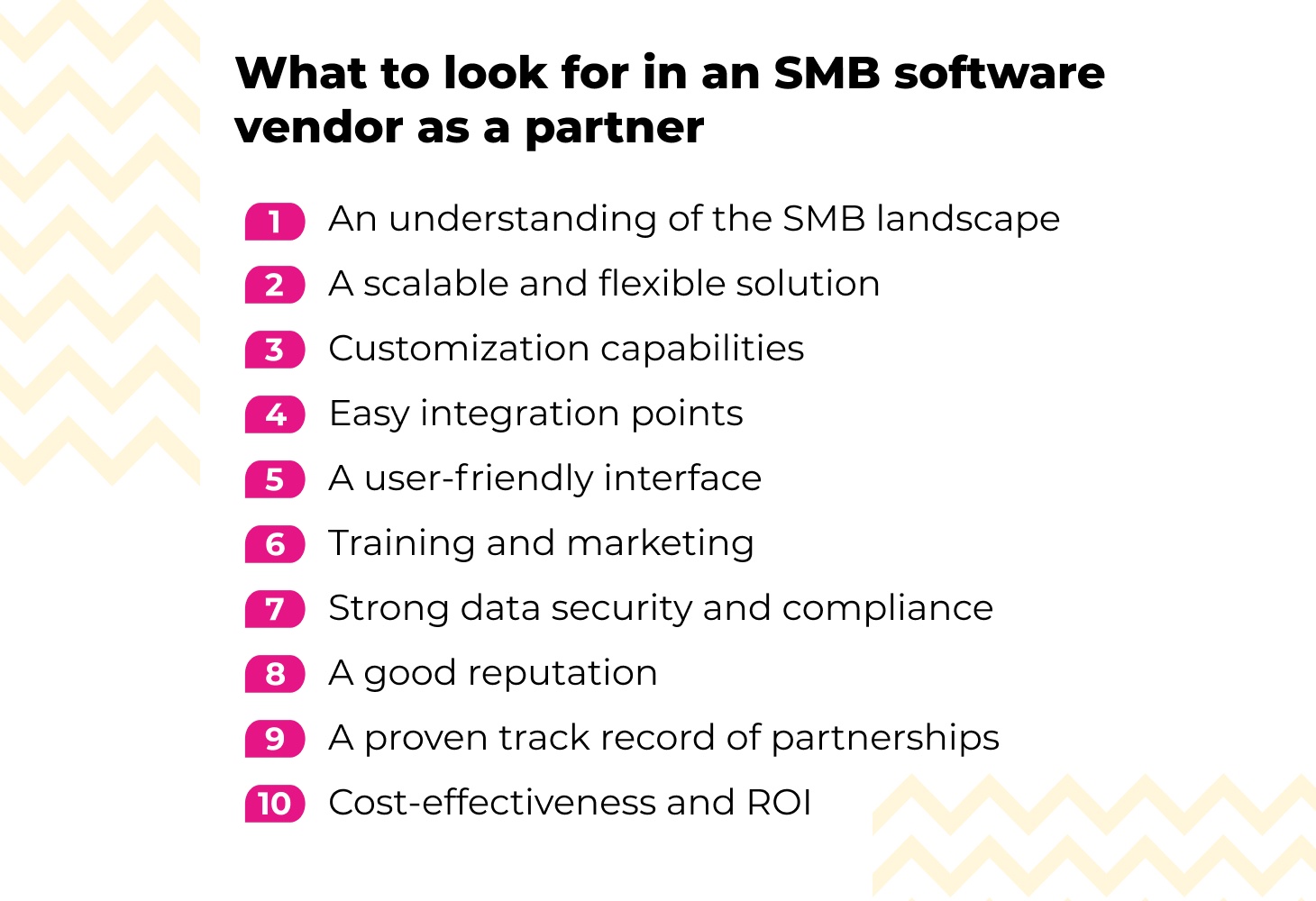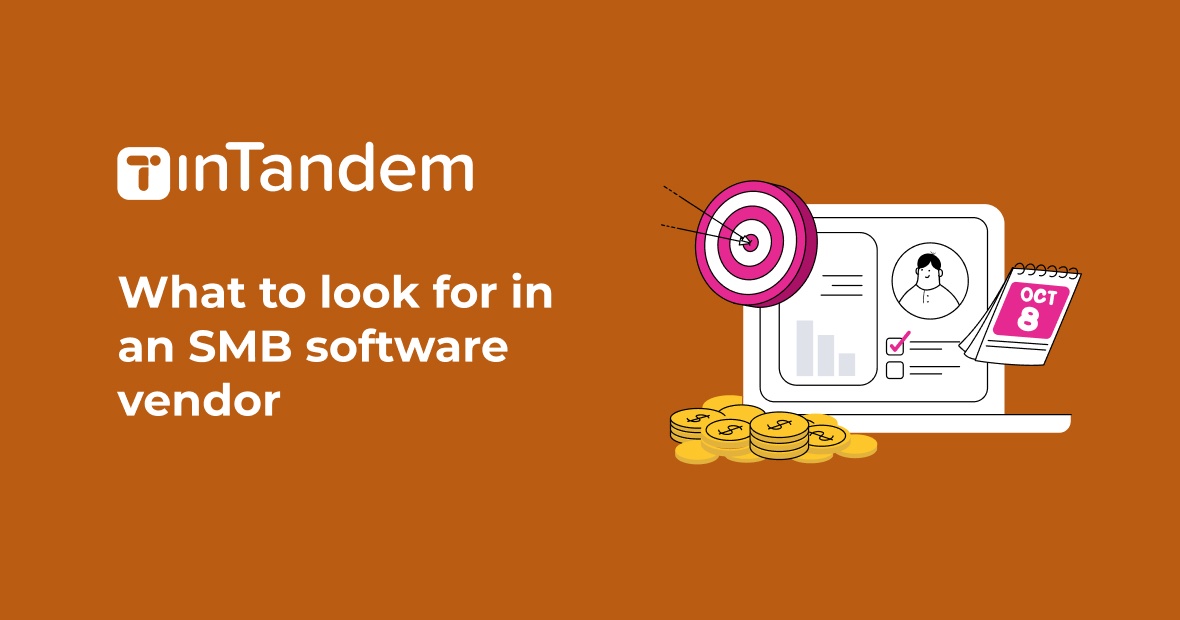Entering a software partnership with an SMB tech vendor is a great way to extend your reach, improve your competitive advantage, and enhance the products and services that you can provide to your small business clients. Adding a unique solution to your offering can help you attract more SMB customers and increase your revenue.
But even when you know about all the benefits that you can enjoy when you partner with a software vendor, you’re still asking yourself “How do I find a software vendor that will help me achieve my goals?”
It can be hard to know what to look for among the many options out there. To help you find a software vendor who’ll be a true partner with your organization, we’ve broken down the top issues to consider before entering a partnership.
The 10 vital signs to look for in a good SMB tech vendor

The best software vendor will be someone who aligns with your goals and shares your values and culture. However, there are a few points that you should look for in any vendor. Here are the key issues to check out in a potential software vendor partner.
1. An understanding of the SMB landscape
It’s vital for any future partner to have a clear understanding of the unique pain points and challenges that small business owners have to overcome. For example, SMBs often have limited budgets and small teams, so they need user-friendly tools, cost-effective pricing models, and multi-use solutions. Choosing vendors who specialize in serving SMBs helps you offer relevant, affordable, intuitive solutions that meet the needs of your SMB clients.
2. A scalable and flexible solution
Your ideal SMB software vendor has a solution that is scalable and flexible. That way, you can start with the out-of-the-box product and add integrations and more solutions as your SMB clients’ needs change. This will help you remain competitive and ensure a long-lasting partnership with your small business clients.
Small businesses themselves often have to deal with fluctuating demands, growth spurts, and changing market dynamics, so they need software that can adapt to their circumstances as well. Investing in scalable, flexible solutions demonstrates that you understand your small business customers, and are committed to serving them no matter what they undergo.
3. Customization capabilities
Every business is different, with its own workflows, requirements, and operational nuances. Your SMB customers need software solutions that are tailored to their specific needs so that they can be more productive and efficient. That’s why you need to partner with a software vendor that has an easily customizable product. When you offer a solution that aligns with your clients’ business objectives, you’ll boost customer satisfaction and trust. The solution you choose should also address a varied market of industries so that it can be better suited to your business’ audience. When one solution can speak the language of many industries, it’s easier to scale and adapt as necessary.
4. Easy integration points
When choosing an SMB software vendor to partner with, finding one that can integrate your existing services into the new solution will guarantee a seamless transition for both your business and your small business clients. It will help you create an all-in-one offering that combines your already perfected services into a well-oiled SaaS software solution.
In addition, show that you understand your SMB clients by offering them a solution that can integrate seamlessly into their existing tech ecosystem to help them streamline workflows. Small businesses often use a variety of applications and systems to manage different aspects of their operations. Collaborating with a vendor that has compatible software minimizes disruption to their daily operations, which encourages a smoother transition and higher adoption rates.
5. A user-friendly interface
Small businesses also tend to have small workforces, where everybody has to wear several hats. It’s rare for them to have a large team of dedicated tech employees, and sometimes there’s no tech team at all. It’s important that you work with a vendor whose solution is easy to learn and intuitive to master, so your small business clients can onboard easily. Complex technology is only likely to cause them headaches and hassle, which will undermine adoption rates and could even harm your existing relationship with them.
6. Training and marketing support
SMBs generally have limited resources and expertise to dedicate to software implementation and management, so they appreciate organizations that can guide them to maximize the potential of their new technology. Seek out software vendors that offer comprehensive training programs, workshops, and marketing collateral, so you can provide the kind of onboarding that your small business clients need. If your internal sales, marketing, and/or support team will be reselling the solution, it’s also important to choose a vendor that has the experience and know-how to train your teams so they can succeed.
7. Strong data security and compliance
Security, data privacy, and compliance with regulations is a significant concern for every business in every vertical. It’s likely to be top of the list of concerns for your SMB clients, especially since they may not have the resources to apply data security and privacy measures independently. You need a vendor who takes it just as seriously as they do. Working with vendors who adhere to industry standards and best practices instills confidence in your customers, and helps them to mitigate risks and uphold trust in the integrity and confidentiality of their data.
8. A good reputation
Small businesses often rely on recommendations and referrals when making decisions about technology investments. Aligning with reputable vendors allows you to benefit from their existing brand image, which helps enhance your credibility and solidify your position as a trusted advisor in the SMB market landscape. A vendor with a positive reputation also means that you can rely on them for value, responsive customer support, and ethical business practices, which are essential for sustaining mutual success in a long-term partnership.
9. A proven track record of partnerships
Entering a partnership with a software vendor can be a leap of faith, but choosing a company with demonstrated success in past partnerships lowers the risks and increases your chances of meeting your goals. Vendors with a history of successful collaborations are more likely to have developed effective communication channels, streamlined implementation processes, and tailored support mechanisms that facilitate smooth integration and ongoing cooperation. Ultimately, a vendor with a proven track record will help enhance your value proposition and trustworthiness within the small business ecosystem.
10. Cost-effectiveness and ROI
Small businesses typically operate on tight budgets, so they prioritize solutions that deliver tangible value and measurable returns. By choosing a software vendor with cost-effective solutions that demonstrate a clear path to ROI, you’ll be able to offer your SMB clients increased efficiency, productivity, or revenue generation. When you promise that your SMB clients will receive maximum value from their software investments, you’ll increase trust and loyalty.
Finding the right SMB software vendor to partner with is the key to success
It’s well worth investing the time and effort to thoroughly check out potential software vendors. When you choose the right one, your partnership is more likely to be successful, bringing more sales and revenue for both of you and cementing your reputation as a trusted advisor with your small business customer base.
By assessing possible partners carefully for everything from their business reputation to the capability and adaptability of their software, you’ll lay the foundation for a mutually beneficial partnership that helps both of you to achieve your long-term goals.
vcita partners with leading organizations that serve SMBs to propel a joint vision of empowering SMB digital transformation. To learn more, check out vcita’s partnership program.



























